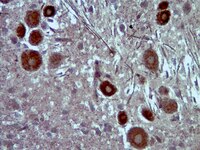Neuromodulation targets intrinsic cardiac neurons to attenuate neuronally mediated atrial arrhythmias.
Gibbons, DD; Southerland, EM; Hoover, DB; Beaumont, E; Armour, JA; Ardell, JL
American journal of physiology. Regulatory, integrative and comparative physiology
302
R357-64
2011
Kivonat megmutatása
Our objective was to determine whether atrial fibrillation (AF) results from excessive activation of intrinsic cardiac neurons (ICNs) and, if so, whether select subpopulations of neurons therein represent therapeutic targets for suppression of this arrhythmogenic potential. Trains of five electrical stimuli (0.3-1.2 mA, 1 ms) were delivered during the atrial refractory period to mediastinal nerves (MSN) on the superior vena cava to evoke AF. Neuroanatomical studies were performed by injecting the neuronal tracer DiI into MSN sites that induced AF. Functional studies involved recording of neuronal activity in situ from the right atrial ganglionated plexus (RAGP) in response to MSN stimulation (MSNS) prior to and following neuromodulation involving either preemptive spinal cord stimulation (SCS; T(1)-T(3), 50 Hz, 200-ms duration) or ganglionic blockade (hexamethonium, 5 mg/kg). The tetramethylindocarbocyanine perchlorate (DiI) neuronal tracer labeled a subset (13.2%) of RAGP neurons, which also colocalized with cholinergic or adrenergic markers. A subset of DiI-labeled RAGP neurons were noncholinergic/nonadrenergic. MSNS evoked an ∼4-fold increase in RAGP neuronal activity from baseline, which SCS reduced by 43%. Hexamethonium blocked MSNS-evoked increases in neuronal activity. MSNS evoked AF in 78% of right-sided MSN sites, which SCS reduced to 33% and hexamethonium reduced to 7%. MSNS-induced bradycardia was maintained with SCS but was mitigated by hexamethonium. We conclude that MSNS activates subpopulations of intrinsic cardiac neurons, thereby resulting in the formation of atrial arrhythmias leading to atrial fibrillation. Stabilization of ICN local circuit neurons by SCS or the local circuit and autonomic efferent neurons with hexamethonium reduces the arrhythmogenic potential. | 22088304
 |









